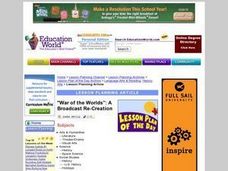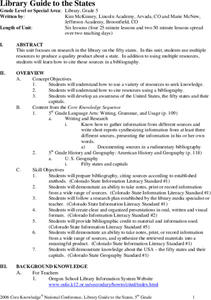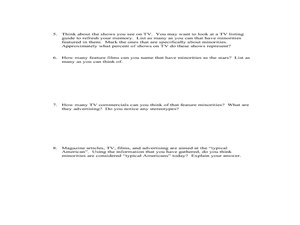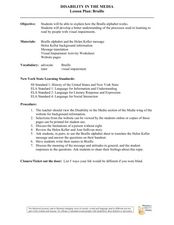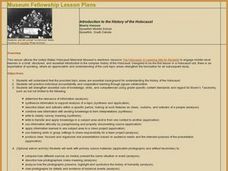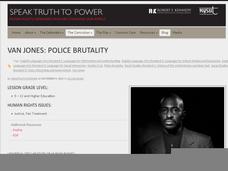Curated OER
Latin America and United States Policy Today
Young scholars compare the situation of Latin American immigrants with the situation of immigrants from other areas of the world. They use media to obtain information on topics of academic interest, personal interest, and intellectual...
PBS
Evolution of the Presidency: Theodore Roosevelt to Franklin D. Roosevelt
How much power should a president be allowed to exert? Theodore Roosevelt and Franklin D. Roosevelt exercised their power according to their interpretations of the United States Constitution, and these interpretations affected the...
Newseum
Free Press Challenges Through History: Analyzing Historical Sources
The debate over the integrity of stories in media is not new. Young journalists analyze historical sources that reveal freedom of the press controversies and draw parallels to challenges freedom of the press faces today.
Curated OER
Class in the Media: Writing a Television Show
Students look at popular media presentations to determine what type of messages they convey about class and class-linked behavior. They listen to contemporary music to explore how the songs touch upon social class issues. They read...
Building Evidence-Based Arguments: Grade 9
High schoolers investigate the dilemma of a proportional response with a lesson about the history of terrorism and militant extremists in the United States. As they examine memos from the FBI and speeches from President Bush and Obama,...
Curated OER
"War of the Worlds": A Broadcast Re-Creation
Why did Orson Welles' 1938 Broadcast of a adaptation of H.G. Wells' The War of the Worlds cause such a panic? To answer this question, class members listen to the original broadcast and research the panic that resulted. They then engage...
PBS
Lessons in Leadership, Roosevelt Style
It's easy to criticize those in power until you're sitting at their desk, faced with the same decisions. A history lesson plan prompts secondary learners to research the Roosevelt presidencies through the lens of leadership and...
Curated OER
Library Guide to the States
Students use a library research activity to research the fifty United States. In this library research lesson, students complete a unit of lessons where they research and study the fifty states in the United States. Students research the...
Curated OER
Breaking Barriers
Determine how African-Americans have broken barriers in this history lesson. Middle schoolers discuss the 15th Amendment and the American civil rights movement prior to analyzing Barack Obama's speech "A More Perfect Union," taking care...
Curated OER
History in Literature - The House of Dies Drear
Hook your learners with a great project. They research the underground railroad and civil rights movement through literature, view the video The Underground Railroad: Escape from Slavery, and read the book House of Dies Drear in their...
Curated OER
Agriculture Shapes Kentucky History
Young scholars explore the lives of early American Indians and settlers in Kentucky. They describe the agricultural practices of Indians native to Kentucky and develop a supply list for a group of settlers coming to the state to...
PBS
Master of the Airwaves: How FDR Used Radio to Ease the Public’s Fears
The political and economic climate during the 1930's was uncertain and tumultuous. But Americans' minds and hearts were eased with the reassuring words of their president, Franklin D. Roosevelt, and addresses over the radio. High...
Curated OER
Minorities in Mainstream American Society
So many people fought for Civil Rights in the United States. Read about the Civil Rights Act of 1964, and discuss what the act guarantees. Then pass out a slew of magazines and encourage them to observe how often minorities appear in...
Curated OER
Disability in the Media Lesson Plan: Braille
Students determine the workings of the Braille alphabet and how people with visual impairments learn how to use it. In this Braille lesson, students study the associated vocabulary, read about Helen Keller, and complete associated...
Curated OER
Art: Faith Ringgold Story Quilts
Twelfth graders examine the impact of African American culture on the United States by inspecting Faith Ringgold's story quilts. Working in groups, they create a collective story quilt about current cultural issues. They research their...
National Constitution Center
Dred Scott v. Sanford
Dred Scott v. Sanford was a watershed moment for the country—and a key moment leading up to the Civil War. Using videos and analytical worksheets, scholars consider the facts of the case and then develop their own arguments before the...
NPR
Civil Rights of Japanese-American Internees
Prompted by a viewing of Emiko and Chizu Omori’s Rabbit in the Moon, a documentary about the internment of Japanese-Americans during World War II, high schoolers examine a series of documents, including the Bill of Rights and the UN’s...
PBS
Universal Declaration of Human Rights
What rights are guaranteed to students? Do they align with the Universal Declaration of Human Rights, which was approved by the United Nations in 1948? Middle and high schoolers present persuasive arguments about the rights they believe...
Civil War Trust
Civil War Newspaper
One photograph can represent so much more than the images on the film. Eighth graders select a photograph from the Civil War era and conduct additional research based on the subject matter from the picture. Once they complete the...
Curated OER
Introduction to the History of the Holocaust
The Holocaust is unbelievable! Examine this piece of history with your class. Using the Internet, research groups determine the relevance of information presented, compare how different sites present the same information, synthesize...
Curated OER
1900 America: Primary Sources and Epic Poetry
Using Walt Whitman's Song of Myself and Hart Crane's The Bridge as models, class groups first craft their own epic poems for 1900 and, using primary sources, create a multi-media presentation that captures the sights and sounds of life...
Robert F. Kennedy Center for Justice and Human Rights
Van Jones: Police Brutality
Develop an understanding of how the media and society are connected and responsible for the defense of universal human rights. Learners investigate and examine the conflicts of police brutality as it is portrayed in the media and through...
Curated OER
Hamilton and Burr : Compare and Contrast
Who were Aaron Burr and Alexander Hamilton? High schoolers examine the character traits of these historical figures and watch the video, The Duel. Hamilton vs. Burr: An Event that Changed History (available from PBS), to gain an...
Curated OER
The American Revolution
Students study the American Revolution using Google Earth and United Streaming online resources. In this American Revolution lesson, students complete a KWL chart with information they know about the American Revolution. Students then...







